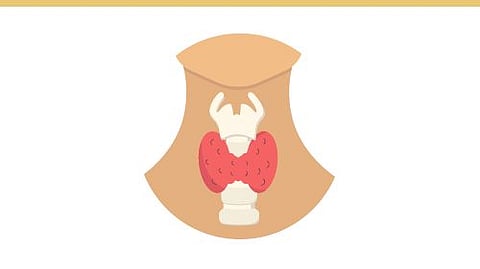
- Mental health mattersMental health matters
- Mental IllnessMental Illness
- Life stagesLife stages
- Caregiving
- Workplace Mental Health
- Legal Matters
- Subscribe

What is the thyroid?
The thyroid gland, located in the neck region, produces a set of hormones called thyroid hormones. These hormones help maintain the body's metabolic rate and synthesize proteins. An imbalance in thyroid secretion can impact a person’s physical health as well as their mental and emotional health.
1. Hypothyroidism, or insufficient secretion of the thyroid hormone (this is the most common thyroid issue faced by Indians, both men and women)
2. Hyperthyroidism, or over-secretion of thyroid hormones
3. Thyroid cancer
4. Goiter (enlargement of thyroid gland)
Of these, thyroid imbalance issues (hyperthyroidism and hypothyroidism), are most common, and affect mostly women.
A thyroid imbalance can cause emotional lows similar to that of mental health issues such as depression and anxiety. Therefore, any diagnosis of a mental illness would first need to be ruled out for thyroid issues.
How are thyroid issues and mental health connected?
1. Persons with hypothyroidism have symptoms similar to that of depression - feeling low, tired, difficulty in concentration and making decisions, loss of appetite and weight gain. Individuals with hyperthyroidism experience symptoms similar to those of anxiety, such as high blood pressure and high heart rate.
2. Thyroid imbalance can also cause physical changes in a woman’s body - weight gain, excess facial hair or protruding eyes, which can then lead to body image issues.
If you have chronic hyperthyroidism, you may experience
Dysphoria (general dissatisfaction with life)
Anxiety
Irritability
Inability to concentrate
If you have hypothyroidism, you may experience:
Feeling low and sad
Brain fog
Lack of interest in activities
Feeling sluggish, lethargic
Experts suggest that any psychiatric treatment should be done either after thyroid issues are treated or simultaneously with thyroid replacement.
Therefore, it is advisable to check your thyroid before proceeding with any kind of psychiatric treatment, or to treat the two conditions in tandem.
Coping with the condition: Self-care
Thyroid imbalance is a long-term condition that requires systematic lifestyle changes along with treatment and medication. Although treatment does help with the psychological aspects of the illness, it is possible that the person may still feel emotional highs and lows. In such situations, the person can:
Talk to their treating doctor about the changes in mood
Talk to someone they trust
Do physical exercise or yoga
Join a support groups
Consider consulting a mental health professional
This content has been created with inputs from psychiatrist Dr Sandip Deshpande, obstetrician and gynecologist Dr Aruna Muralidhar, and psychologist Garima Srivastava.
We are a not-for-profit organization that relies on donations to deliver knowledge solutions in mental health. We urge you to donate to White Swan Foundation. Your donation, however small, will enable us to further enhance the richness of our portal and serve many more people. Please click here to support us.
